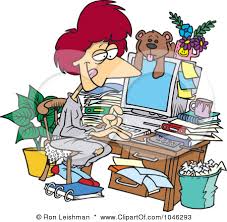BEAT WORK OVERLOAD. BE MORE
EFFECTIVE. ACHIEVE MORE.
(EXTRACTION FROM TIME MANAGEMENT at http://www.mindtools.com)
WORK SMARTER. IMPROVE TIME
UTILIZATION.
Time management is
an essential skill that helps keep our work under control, at the same time
helps keep stress to a minimum. We would
all love to have an extra couple of hours in every day. Seeing as that is
impossible, we need to work smarter on things that have the highest priority,
and then creating a schedule that reflects our work and personal priorities. Work in a focused and effective way, and we
can really start achieving those goals, dreams and ambitions that we care so
much about.
AVOIDING COMMON PITFALLS
One of the most
effective ways of improving productivity is to recognize and rectify time
management mistakes. Take the time to overcome these mistakes, and it will make a huge difference in productivity
- and you'll also be happier, and experience less stress!
|
NO.
|
MISTAKES
|
|
1
|
Failing to Keep a
To-Do List
|
|
2
|
Not Setting
Personal Goals
|
|
3
|
Not Prioritizing
|
|
4
|
Failing to Manage
Distractions
|
|
5
|
Procrastination
|
|
6
|
Taking on too Much
|
|
7
|
Thriving on
"Busy"
|
|
8
|
Multitasking
|
|
9
|
Not Taking Breaks
|
|
10
|
Ineffectively
Scheduling Tasks
|
No comments:
Post a Comment